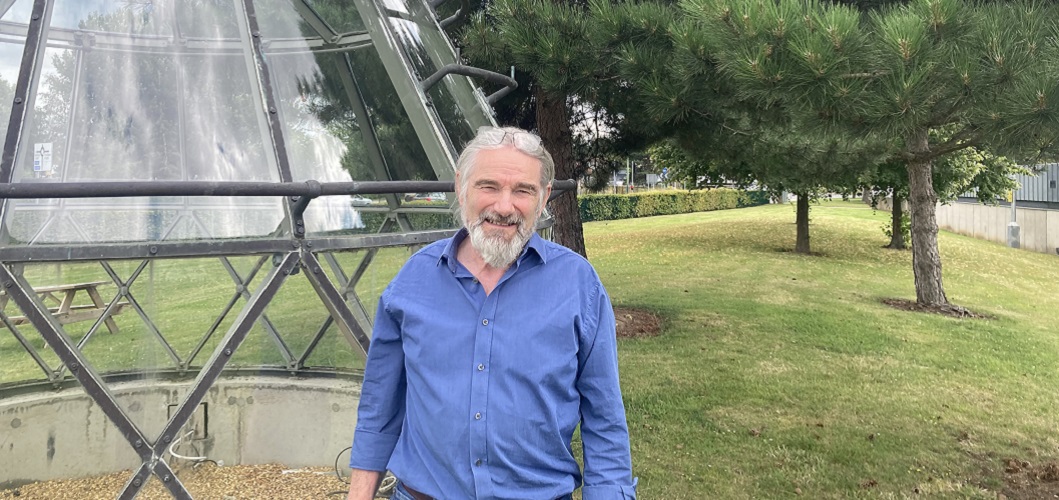"Blake was always around sitting on my shoulder and rattling my cage...as a scientist, I believe he prevented me from falling into complacency"

Are creative arts and sciences inherently opposed, or can the two find some union together for the benefit of progress? If asking Associate Professor Keith Davies, a biologist at the University of Hertfordshire by trade – and a creative at heart – he’ll tell you that their union is paramount, and imagination should be re-established as a central attribute of science.
It’s an argument he explores and establishes through his new book, William Blake, the Single Vision and Newton’s Sleep: A History of Science, Poetry and Progress. A scientist’s take on literary analysis, he uses the work of English poet William Blake to draw on examples from biology, history, literature, philosophy and economics and provide an alternate understanding of science with imagination, and its continued significance in today’s world. Here we speak to him to find out more.
The key themes within William Blake, the Single Vision and Newton’s Sleep: A History of Science, Poetry and Progress are quite complex, how did they originate?
The subject of the book has been haunting me for many years, but it suddenly became concrete to me during a trip the Chamonix Valley with my daughter in February 2020. It was while standing by the River Arve, looking up at Mont Blanc, that I suddenly knew how the book would begin; with PB Shelley’s visit to the valley in July 1816 - the inspiration for his poem Mont Blanc. I did not know exactly what I would write, but it would be something about scientific revolution in relationship to climate change. I also wanted to pair this with a reading of the works of William Blake, who argued reason is not the only arbiter of human progress. A few weeks later, Covid-19 and lockdown struck and it would allow me to unpack and make sense of these themes in a historical context.
Could you tell us more about your own scientific background and how this has informed your choice of topic?
In the 1970s I had to decide whether to follow a path within creative arts or sciences at school. Jacob Bronowski’s TV series The Ascent of Man, which looked at human history through scientific achievements, was ultimately the catalyst in my decision to study Physics, Chemistry and Biology at A-level. It was a time of oil price rises and environmental sustainability was becoming an increasingly important issue, so I enrolled at what was then The Hatfield Polytechnic (now University of Hertfordshire) to study Applied Biology with the option to specialise in ecology. In the autumn of 1978, I returned to the campus and the newly opened C.P. Snow building, named after the writer who articulated the Two Cultures debate and the split between the arts and sciences. There, in the campus bookshop, I came across a book of Blake’s poetry with a forward by Bronowski – the same person behind The Ascent of Man TV series which had inspired me to study science years earlier – which piqued my interest in the poet. I came to realise that scientific knowledge and its application are double-edged swords. While science has hugely advanced human progress, it has also contributed to problems facing the world today, such as climate change. In the book, I therefore turn to figures like Blake to argue for imagination to be re-established as a central attribute of science, to help to resolve some of our most pressing ecological problems.
What draws you to Blake and his works?
I had grown up in a Western culture where science and technology were seen, and still are seen, as the foundation of progress. While this is a view I certainly would not want to deny, I was drawn to Blake’s work because it contrasts this assumption by arguing that reason alone can be limiting – alongside highlighting many other philosophies. As a scientist, Blake was always around sitting on my shoulder and rattling my cage. I believe he prevented me from falling into complacency within my professional work, a tension I hope my book explores.
How important is a union between sciences and the creative and arts?
From the time of the Scottish Enlightenment – a historical period in the 18th century characterised by its regular intellectual advancements – writers like David Hume have elevated reason at the expense of imagination. This is a profound problem that hinges on the nature of knowledge. According to Blake, this separation has resulted in the impoverishment of our view of the world, which I agree with. In a totally interconnected world, scientific method relies on what is and what is not relevant, and this rests on judgements that are essentially informed by imagination. Furthermore, today’s environmental concerns have become increasingly pressing and there is an undeniable need to again enfranchise imagination and heal the division between creative arts and the sciences.
What do you hope people will take away from reading William Blake, the Single Vision and Newton’s Sleep: A History of Science, Poetry and Progress?
We are not going to abolish the industrial revolution. Science and technology are a core part of our culture and will continue to be. But the future of progress, and our ability to avoid disasters like climate change, lie in our ability to imagine alternatives to them. I hope people will finish the book with a newfound confidence that we can imagine these new futures, using science and the creative arts together.